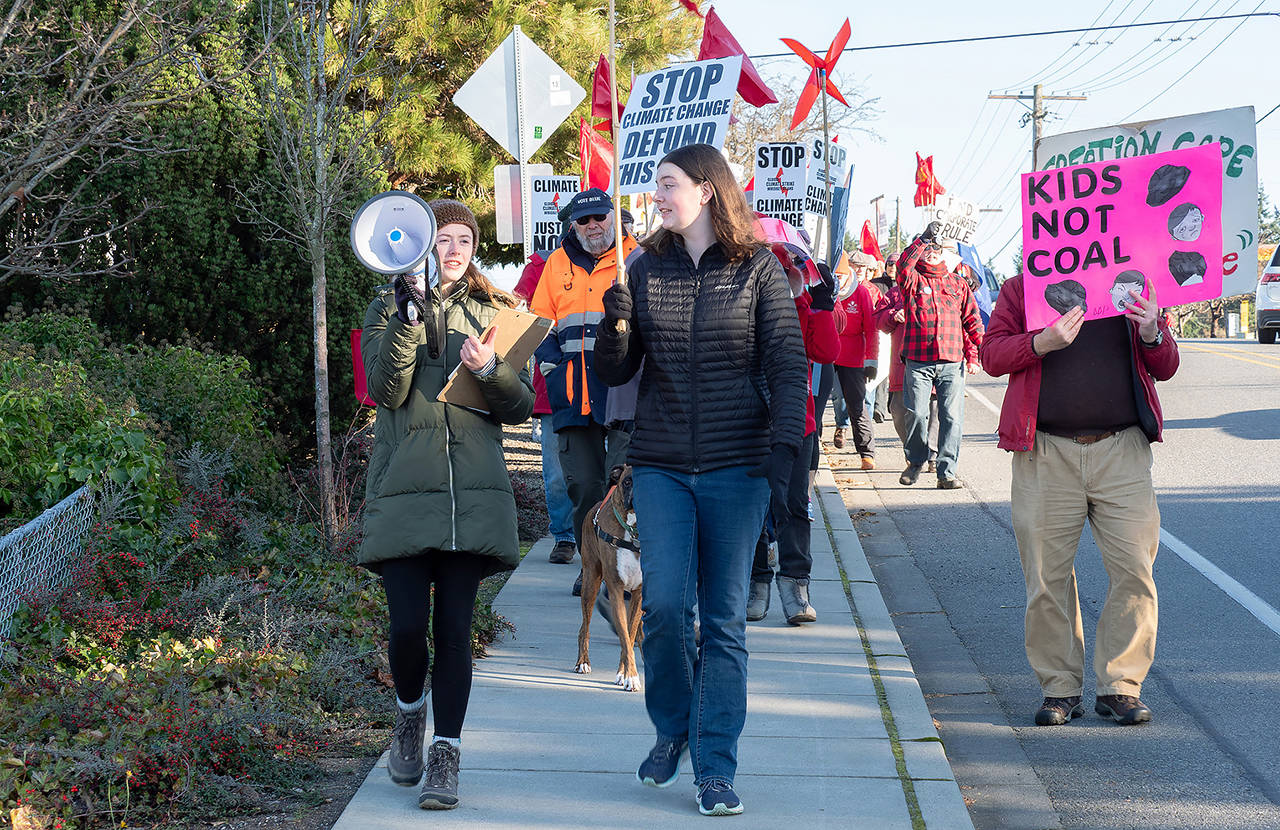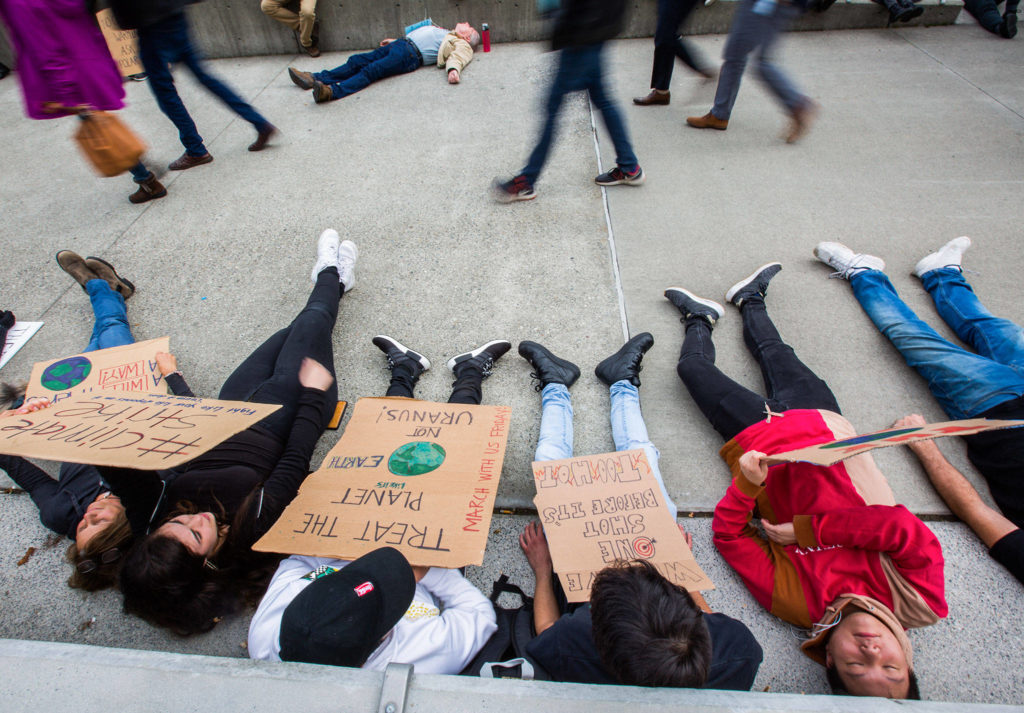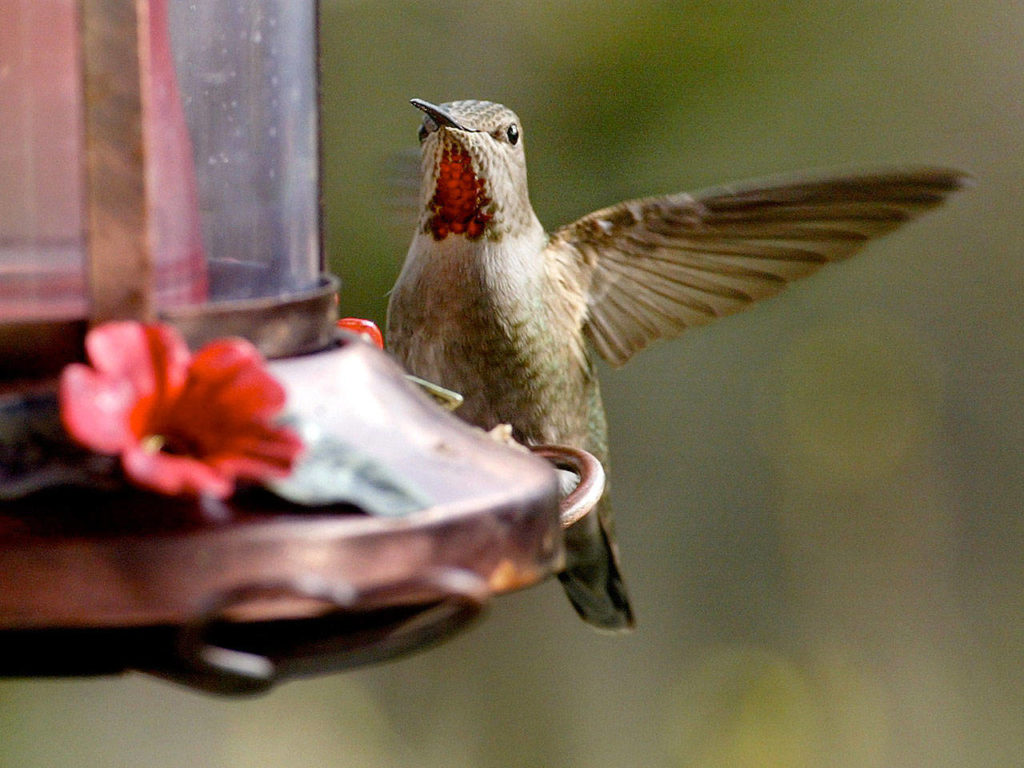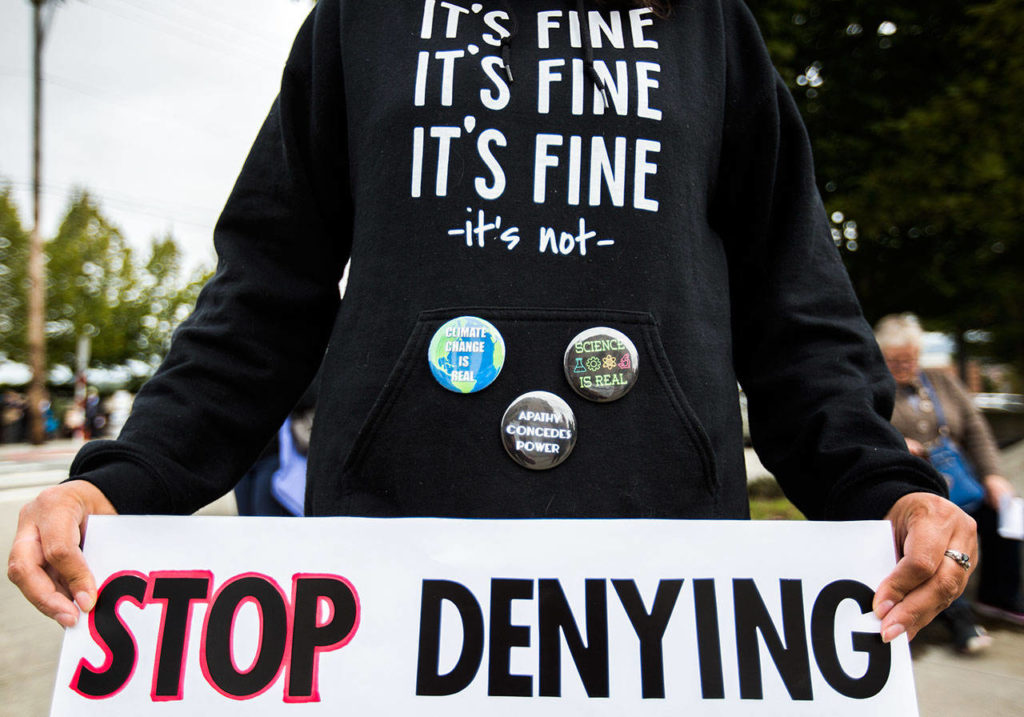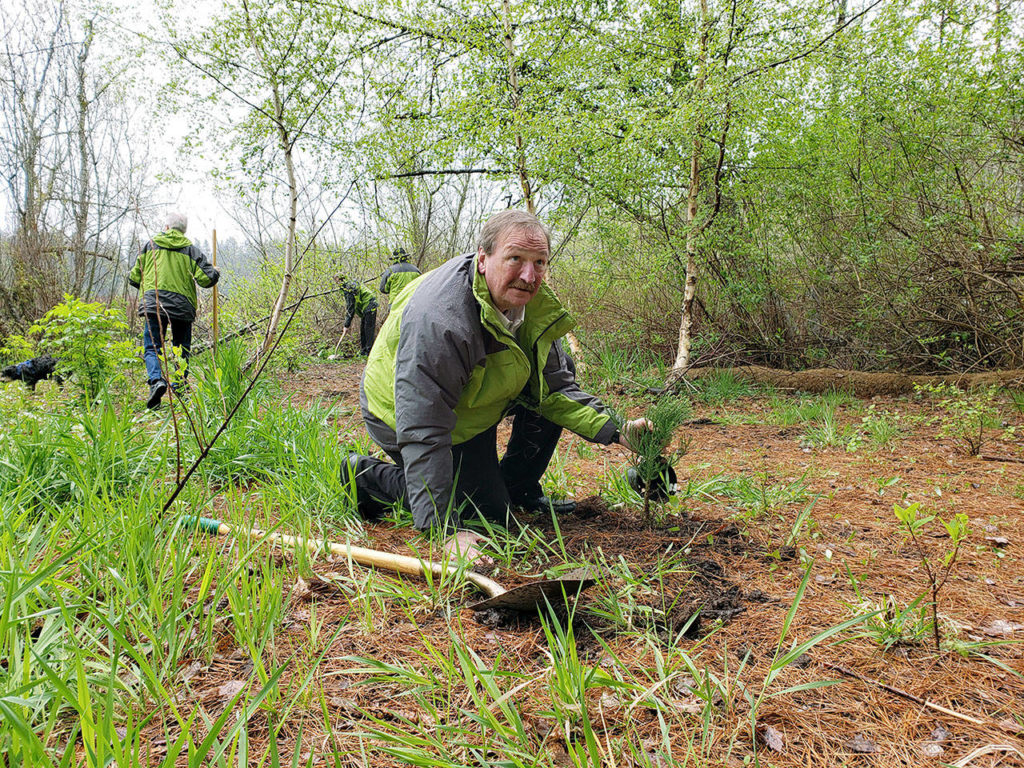It was a family conversation several years ago that ignited Jeanine SanClemente’s community activism. The topic at hand was an overwhelming global problem that was already depressing the Maltby-area mother of four.
Over dinner, her oldest daughter, Chelsea, made the announcement: Don’t count on having grandchildren. With climate change accelerating, the future is just too bleak.
No grandchildren? The comment fell like a lit match in a drought-stricken forest. “I felt I could no longer sit back and let other people make sure the Earth was livable for my kids.”
According to 2020 Yale University nationwide polls, 78% of residents in Snohomish County, and 71% in Island County, believe that global warming is happening. The number who worry about it are 68% and 64%, respectively. More of those worriers are becoming climate warriors. They are beefing up the climate focus of established environmental groups, joining newer organizations that are laser-focused on climate, and even — as is the case with two Whidbey Island teens — organizing on their own.
Lisa Dulude, who manages Snohomish County’s Office of Energy and Sustainability, is encouraged by an uptick in citizen activism that she has seen in recent years.
“We have this strong community group coming to our county officials and saying, ‘This is really important, we need to do more,’” she said.
Gaining traction
There was no shortage of interest when Snohomish County created a Climate Action Advisory Committee, which started meeting last January. Thirty-five people applied. Thirteen were chosen, including SanClemente and representatives of the business, youth, research, tribal and other minority communities. The committee sprang from the Snohomish County Climate Alliance Facebook group that SanClemente created with the goal of connecting like-minded people. Snohomish County Council members Stephanie Wright and Megan Dunn joined. Then Wright invited SanClemente to her office to talk about the potential for a citizens’ committee to advise elected officials.
Wright and Dunn are Democrats. Efforts to address climate change also have the support of Republican Nate Nehring, who serves on the five-member council and is a former science teacher. While the county GOP platform says that “global warming is not settled science,” he has a different perspective.
“You can certainly ask questions about the politics of it. But I don’t have questions about the science. I think if you look at the younger generation of Republicans, we have more concern about the environment,” said the 25-year-old Nehring.
Snohomish County Executive Dave Somers is a former fisheries biologist who has been on the climate change bandwagon for decades. That included 18 years working for the Tulalip Tribes, which have made the issue a priority. “It’s frightening, it’s urgent, and I’m glad citizens are getting involved,” Somers said.
Local governments’ biggest roadblock, by all accounts, is lack of money to reduce gas emissions by electrifying vehicle fleets and making buildings more efficient — even though those measures will save on energy costs. Adapting to the impacts of climate change can be especially expensive. Flood control improvements and robust emergency services don’t come cheap.
Despite the challenges and SanClemente’s fears that the advisory committee would be a place where “good ideas go to die,” she thinks the group is getting traction. Its 2020 goal is to help update the 2013 Sustainable Operations Action Plan, which aimed to reduce greenhouse gas emissions in county operations. Then comes a three-year effort to create a countywide climate action plan.
That second goal is what most interests committee member Yolimar Rivera Vázquez. The Lynnwood resident works for EcoTrust, an environmental nonprofit, and did marine science research at Western Washington University. Her question while studying marine life on the Salish Sea shore: What makes certain algae and seaweed populations soar as the water warms? Her question now: How can minority neighborhoods overcome transportation, housing and other challenges made worse by climate change?
As they research the best approach for Snohomish County, advisory group members are reviewing sustainability plans from throughout the region. That includes a plan Everett adopted in January.
Rivera Vázquez hopes the public will be willing to speak up, and pony up, when the advisory group makes its recommendations to the county council.
Reaching out
Retired teacher Pam Kepford was knee-deep in the issue well before venturing out to a flooded downtown Everett on Sept. 9, 2019. More than 10 percent of the city’s annual rainfall came down that day, most of it within 50 minutes. Everett High School closed early due to flooded classrooms. Kepford sees that 200-year rain event, like 2020’s massive wildfires, as evidence of climate change. Eleven days after the flooding, she was back downtown with 280 other demonstrators for a “die-in” that she organized as part of a Global Climate Strike.
Four years earlier, the Everett resident had shopped around for a climate change group to join. She chose 350.org because of its emphasis on science, and is now 350 Everett chapter president.
The organization’s name is a reference to 350 parts per million of carbon dioxide, which has been identified as the safe upper limit to avoid a climate “tipping point.” This year, carbon dioxide levels hit 417 ppm, the highest in human history. 350 Everett proposed that the Snohomish County Council adopt a clean energy goal, as did the Snohomish County chapter of The Climate Reality Project, the Sierra Club and Environment Washington.
Kepford compares climate change to systemic racism. “This is like that, only bigger. People can’t stop racism individually; there needs to be a complete societal change, a political change,” she said.
Not that 350 Everett members would discourage anyone from consuming less, planting trees and growing their own food — all of which reduce carbon emissions. Member Bill Sheets is always looking at rooftops that could have solar panels. Mary Rollins, a chef with an electric stove, sees natural gas as a huge contributor to climate change.
“I watch those DIY shows where people say, ‘I can’t have this house, there’s no natural gas there,’” Rollins said. “I just want to throw something at the TV.” The Citizens Climate Lobby takes square aim at Congress. CCL’s goal is passage of the Energy Innovation and Carbon Dividend Act, which would charge a fee for carbon emissions and then distribute the proceeds to U.S. residents as a monthly dividend to spend as they wish.
“That surgically attacks the actual problem,” said Bob Hallahan, who heads the CCL Whidbey Island chapter. “The market doesn’t appropriately price pollution,” he said. “When a carbon tax was proposed here in Washington, there was a lack of trust that the state would keep its hands off the money.”
Hallahan is a commercial airline pilot. In his earlier Navy career, he said, “I flew over Pacific islands — these gorgeous tropical paradises, Wake Island in particular. It crushes me to think about what will happen to them” as sea levels rise. “Also, I have two kids, and I’m wary about their future.”
Hallahan appreciates CCL’s moderate approach and willingness to work with the other side. By which he means Republicans. While Energy Innovation Act sponsors are overwhelmingly Democrat, the group emphasizes a bipartisan approach.
Lee Alley, leader of the five-month-old CCL Snohomish chapter, emphasizes the organization’s educational resources and its constituent-to-representative approach. “The most significant effect on a member of Congress is hearing from one of their voters, not a paid lobbyist,” he said.
Alley is retired after a career in physics, computer science and engineering. He also ran his own business for 10 years. He hopes to get local conservatives involved in CCL. Meanwhile, he’s finding diversity in the young people who are signing on to his chapter, which is dominated by senior citizens — a common trait of local environmental groups. “Younger people are passionate about climate. It rises to the top of our list,” said CCL member Ash Risher of Mukilteo, who is grateful to be able to stay at home with her 5-year-old son. She likes CCL’s approach. “Many, many households would get income. There’s an online (carbon dividend) calculator that that explains how much you’d get.”
Sandra Zmeu, a mechanical engineer who moved to Everett after college last year, said she likes focusing on the technical climate change solutions such as solar energy. But “the political and social things need to happen,” so she joined CCL.
Like other teens around the planet who have been inspired by Swedish environmental activist Greta Thunberg, two South Whidbey High School students are determined to alter the trajectory of climate change. Best friends Annie Philp and Maggie Nattress organized a Whidbey Climate Strike in September 2019, drawing 150 people to march in front of Freeland banks demanding divestment from fossil fuel companies. They spoke at a well-attended “climate conversations” gathering of environmentalists in Langley. Then they founded United Student Leaders and began holding weekly Fridays for Future marches after school.
The students held 32 protests before the COVID pandemic pushed their activities online. But the pandemic hasn’t slowed them down. Like many other environmental groups, they’ve expanded their focus to include social justice. They have circulated a petition asking school district officials to reboot the curriculum in ways that acknowledge COVID-19, racism, oppression and climate change.
“We have really amazing teachers who are going above and beyond, but they don’t have the background necessary to teach such things as tracking your carbon footprint,” Philp said.
The teens grew up in politically concerned families who talked about climate change. So their parents are supportive, Philp and Nattress said, if a bit concerned about how much time their daughters spend on Zoom.
Environmental heavyweights
When she retired from nursing a few years ago, Nancy Johnson of Edmonds turned her attention full force to climate change activism. She campaigned for Washington’s ill-fated carbon emissions fee ballot measure, Initiative 1631. She took the online course offered by Al Gore’s Climate Reality Project. She’s studying climate solutions proposed by the book “Drawdown,” along with members of her Unitarian Universalist congregation. But much of her energy is focused on the 128-year-old Sierra Club, with its 3.8 million members and 25 policies related to climate and energy alone. She serves on the executive committee of the club’s Sno-Isle Group.
When it comes to climate change impacts, little escapes Johnson’s attention.
“There’s a sewage lagoon in Everett that could get breached with sea level rise … COVID has made public transit just crash, so how do we make it safe again and keep people out of cars? … The Growth Management Act is coming up for revision, and it needs tweaking …”
“I grew up on a farm,” she added. “And if we don’t have snow, we don’t have food.”
The Audubon Society is another environmental powerhouse. Its “Survival by Degrees” campaign lists 389 bird species at risk of extinction from climate change. But local birders don’t need to go online to know big changes are happening.
Birds that used to be rare or unknown in Western Washington are showing up here, pushed out of dry conditions in the south or finding new warm-weather food up north. White pelicans have begun hanging out in Whidbey Island’s Deer Lagoon. Scrub jays that once traveled no farther north than the Columbia River are now spotted at the Peace Arch in Blaine, said Pilchuck Audubon member Rick Taylor.
Populations of shiny green Anna’s hummingbirds, natives of Southern California, have “taken off like a rocket,” Taylor said. They are lured not only by the ubiquitous backyard feeders but by winter temperatures that are now warm enough for them to survive.
“Conversely, there are some species you can’t find anymore,” Taylor said. “We used to go up into the mountains along the border and find the boreal chickadee. I haven’t heard a report of anyone finding one for years.”
Pilchuck Audubon members are taking part in a National Climate Watch Initiative. Volunteers monitor bird populations on a grid of squares. There are 10 squares in Snohomish County.
“We have claimed five or six of those,” said Pilchuck Audubon director Brian Zinke, a biologist. “We go out and listen for the red-breasted nuthatch, which sounds like a car alarm.”
Beyond such citizen science, people can help birds by creating backyard habitat and following other advice in the Audubon Climate Action Guide.
“You have to focus on what you do,” Zinke said. “Not how bad it is.”
Sadness and solidarity
References to sadness creep into nearly every interview with climate activists.
They say it’s a struggle to keep cheerful. They say they sometimes feel despair.
“Someday we will be gone, and the Earth will heal itself,” said Bonny Headley, who’s with Green Snohomish. “Somehow that gives me comfort.”
Jeanine SanClemente, that Maltby mom whose activism was launched a few years back by her daughter Chelsea’s cautionary comment about grandchildren, hopes that enough meaningful change will happen to protect future generations. Chelsea is now a Yale University law student.
“Chelsea honestly feels that without a Green New Deal, there isn’t a ton of hope,” said her mother. “She feels that the decisions of the generations before her have affected her ability to live the life her parents and grandparents lived. The gravity of having children is completely different for her generation.”
SanClemente has a Ph.D. in educational psychology. Now she may get a master’s degree in clinical psychology so she can help people cope with eco-grief. She has already teamed up with physician Jon Witte and neuropsychologist Alice Armstrong to offer local climate anxiety workshops.
Constructive action, Armstrong said, is indeed the best antidote to fear. “We as humans can move beyond fight, flight or freeze.”
Ironically, dire evidence of climate change, including this year’s catastrophic Western fires, bolsters activists’ hope that the general public will act.
Joan Smith, natural resources chairperson for the League of Women Voters of Snohomish County, is planning an Oct. 21 online forum about climate change. In 2007, she organized a similar forum at Edmonds Community College. The speakers were phenomenal, she said. Attendance was not.
“My heart tells me they would pour in the doors now.”
Everett writer Julie Titone can be reached at julietitone@icloud.com.
A new way to support local journalism
This article is made possible by contributions to The Daily Herald’s Environmental and Climate Change Reporting Fund, part of an effort to find new ways to help pay for the local journalism that is essential to a vibrant community.
The fund, established in cooperation with the Community Foundation of Snohomish County, provides an opportunity to make tax-deductible donations to help support environmental and climate change journalism in The Herald newsroom.
This latest grassroots initiative already has drawn support from the League of Women Voters of Snohomish County, the Washington State Sierra Club and 350 Everett, a climate action group. We’re pleased to have their backing as we seek new resources to help us cover topics that are important to our readers.
The Daily Herald maintains editorial control over content produced with fund resources.
To donate to the fund, please go to www.heraldnet.com/climatefund.
About our writers
Julie Titone
Julie Titone has been a reporter, editor and nonprofit communications professional at The Spokesman-Review (Spokane), the Idaho Statesman (Boise), the University of Notre Dame, Washington State University and Sno-Isle Libraries.
Her honors have included a Kiplinger Fellowship in Public Affairs Reporting, a C.B. Blethen Award for Enterprise Reporting, and a Watershed Hero Award from the Center for Environmental Policy and Sierra Club Upper Columbia Group.
Her work has been included in three college textbooks and three essay collections. She is co-author of the memoir “Boocoo Dinky Dow: My Short, Crazy Vietnam War.” She lives in Everett.
She can be reached at julietitone@icloud.com.
Julia-Grace Sanders
As the Daily Herald’s science and environment reporter, Julia-Grace Sanders covers climate and people from Puget Sound to the Cascades. In her nearly three years here, she has documented how a changing climate is impacting Snohomish County’s animal and human inhabitants and worked to keep public agencies accountable in their stewardship of natural resources. She’s written stories about the tug-of-war between conservation and economy in the county’s legacy timber industry, pollution from decades of industry along the Everett waterfront and the science behind carbon sequestration and regenerative farming.
As a lifelong outdoor enthusiast — from surfing to horseback riding to hiking — she’s curious about the natural world. Her interest in environmental journalism was piqued while covering agriculture for a newspaper in Skagit County, where she saw just how intertwined human well-being is with that of the environment.
In addition to her environmental beat, she covers public utilities, daily news and east Snohomish County cities.
To contact her, email jgsanders@heraldnet.com or go to @sanders_julia on Twitter.
Talk to us
> Give us your news tips.
> Send us a letter to the editor.
> More Herald contact information.
